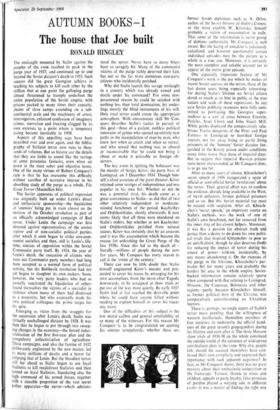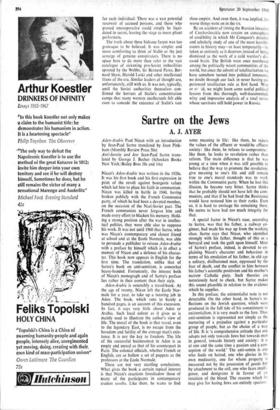The house that Joe built
AUTUMN BOOKS — I
RONALD IIINGL EY
The onslaught mounted by Stalin against the peoples of the USSR reached its peak in the purge year of 1937, and continued up to and beyond the Soviet dictator's death in 1953. Such success did the great Georgian achieve in teaching his subjects to kill each other by the million that at one point the galloping purge almost threatened to trample underfoot the entire population of the Soviet empire, with prisons packed to many times their capacity, chains of slave camps extending on a sub- continental scale and the machinery of arrest, interrogation, enforced confession of imaginary crimes, starvation and freezing clogged by its own excesses to a point where a temporary easing became inevitable in 1938.
Aspects of this appalling saga have been described over and over again, and the biblio- graphy of Stalinist terror now runs to thou- sands" of volumes. But so bizarre are the details that they are liable to sound like the ravings of some paranoiac fantasist, even when set down in the most sober and objective terms. One of the many virtues of Robert Conquest's style is that he has overcome this difficulty without sacrifice of narrative interest in his absorbing study of the purge as a whole, The Great Terror (Macmillan 84s).
The Soviet apparatus of political repression was originally built up under Lenin's direct and enthusiastic sponsorship—the liquidation of 'enemies' being put in train almost on the morrow of the October revolution as part of an officially acknowledged campaign of. Red terror. Under Lenin the campaign was first directed against representatives of the ancien regime and of non-socialist political parties, after which it soon began to strike non-com- munist socialists and then, still in Lenin's life- time, sources of opposition within the Soviet Communist party itself. By 1924. the year of Lenin's death, the execution of citizens who were not Communist party members had long been accepted as a normal form of political activity, but the Bolshevik revolution had not yet begun to slaughter its own makers. Soon, however, the very party leaders who had so casually sanctioned the liquidation of others found themselves the victims of a specialist in violence whom many of them had dismissed as a nonentity, but who eventually made his own political colleagues the prime target for his spite.
Emerging as victor from the struggles for the succession after Lenin's death, Stalin was virtually unchallenged dictator by 1928. It was then that he began to put through two sweep- ing changes in the economy—the forced indus- trialisation of the first five-year plan and the compulsory collectivisation of agriculture. These campaigns, and also the famine of 1932 deliberately engineered by the new master, led to many millions of deaths and a terror far eclipsing that of Lenin. But the bloodiest terror still lay ahead as Stalin began to use loyal Stalinists to kill recalcitrant Stalinists and then turned on loyal Stalinists, liquidating also the high command of his armed forces, together with a sizeable proportion of the vast secret police apparatus—the rncvo—which adminis-
tered the terror. Never have so many biters been so savagely bit. Many of the communist victims of the purge richly deserved their fate, but not so the far more numerous non-party citizens who incidentally perished.
Why did Stalin launch this savage onslaught in a country which was already cowed and docile under his command? For some tem- peramental reason he could be satisfied with nothing less than total domination, his under- lings merely the blind instruments of his will. Only total terror could create the appropriate atmosphere. With consummate skill Mr Con- quest describes Stalin's tactics in pursuit of this goal—those of a patient, ruthless political innovator of genius who opened up entirely new paths in the manipulation of man by man, who knew just when to attack and when to retreat, and who sensed that nothing was so absurd or inconceivable that he could not bring it about or make it palatable to foreign ob- servers.
The key event in igniting the holocaust was the murder of Sergey Kirov. the party boss of Leningrad. on 1 December 1934. Though him- self a close associate of the great dictator. Kirov retained some 'vestiges of independence and was popular in his own fief. Whether or not he was a potential rival, his death came as a great convenience to Stalin—as did that of two other relatively independent or moderate- minded henchmen of the period, Kuybyshev and Ordzhonikidze, shortly afterwards. It now -seems likely that all three were murdered on Stalin's orders, but whether or not Kuybyshev ' and Ordzhonikidze perished from natural causes, Kirov was certainly shot by an assassin. and it was this assassination which became the excuse for unleashing the Great Purge of the late 1930s. Since this led to the death of- literally—millions of people during the next few years, Mr Conquest has every reason to call it the 'crime of the century.'
There can now be little doubt that Stalin himself engineered Kirov's murder and pro- ceeded to cover his traces by arranging for his own accomplices, from the NKVD chief Yagoda downwards, to be arraigned at show trials or put out of the way more quietly. By early 1937 Stalin had at last reached the desirable point where he could have anyone killed without needing to explain himself or cover his traces any more.
One of the difficulties of this subject is the low moral calibre and general unreliability of so many of the witnesses. For this reason Mr Conquest is to be congratulated on quoting his sources scrupulously, whether these are
former Soviet diplomats such as A. Orlov, author of the Secret History of Stalin's Crimes. or the more credible W. Krivitsky, himself probably a victim of assassination in exile. That some of the information is NKVD gossip of dubious authenticity Mr Conquest is well aware. But the lacing of anecdote is judiciously calculated. and however questionable certain individual episodes may be. the picture as a whole is a true one. Moreover, it is certainly the most complete and reliable account yet to appear of the entire grim episode.
One especially important feature of Mr Conquest's work is the use which he makes of recent Soviet sources on the terror, those of the last dozen years being especially interesting. for during Stalin's lifetime no Soviet citizen dared so much as to hint in public at the true nature and scale of these repressions. In any case Soviet publicity resources were fully com- mitted to portraying this Georgian super- mafioso as a sort of cross between Einstein. Pericles, Jesus Christ and John Stuart Mill. While guides displayed the comparatively salu- brious Tsarist dungeons of the Peter and Paul Fortress in Leningrad to horrified foreign tourists, not far away living or partly living prisoners of the 'humane' Soviet dictator lan- guished in the Kresty prison under conditions many times worse than those of imperial days. But to suggest that imperial Russian prisbns were never overcrowded, as Mr Conquest does, is to go too far.
After so many years of silence, Khrushchev's secret speech of 1956 inaugurated a spate of official or semi-official Soviet 'revelations' about the terror. Their general effect was to'confirm the evidence, already long available in the West, of NKVD defectors, former political prisoners and so on. But this Soviet material too must be treated with suspicion. After all, Khrush- chev's 'secret speech,' an important source- on Stalin's methods, was the work of one of Stalin's own henchmen, not far removed from the inner ring of his closest helpers. Moredver, it was less a passion for abstract truth and justice than a desire to do down his own politi- cal rivals that inspired Khrushchev to pose as an anti-Stalinist, though he also deserves &edit for reducing the impact of terror during his tenure of power—without, incidentally; by any means abandoning it. On the excesses of the purge in the Ukraine, Khrushchev's par- ticular fief for many years and probably the hardest hit area in the whole empire, Soviet- backed information remains relatively sparse when compared with that relating to Leningrad, Moscow, the Caucasus, Belorussia and other regions—partly because Khrushchev himself, as former political boss of the Ukraine, was comparatively unforthcoming on Ukrainian horrors.
There is, perhaps, no single aspect of Stalin's terror more puzzling than the willingness. of western intellectuals, themselves members of free societies, to underwrite the official hand- outs of the great tyrant's propagandists during his lifetime and even after it. The three Moscow show trials of 1936-38 on the whole convinced the outside world of the existence of widespread anti-Stalinist plots in the USSR. Why else, pecipte felt, should the accused themselves have con- fessed their own complicity and expressed their repentance with such apparent eagerness? In fact, as Mr Conquest shows, there was no great mystery about their enthusiastic cooperation in the frame-ups. Torture, threats to wives and children, appeals to party loyalty, false promises of pardon 'played a varying role in different cases—it was a matter of finding the right mix for each individual. There was a vast potential reservoir of accused persons, and those who proved uncooperative could simply be liqui- dated in secret, leaving the stage to more pliant performers.
The truth about these hideous farces was too grotesque to be believed. It was simpler and more comforting to think of Stalin as the just scourge of genuine conspirators. There is no space here to do more than refer to the vast catalogue of sickening pro-Soviet imbecilities spouted by the Webbs, Sir Bernard Pares, Ber- nard Shaw, Harold Laski and other intellectual titans of the era. Similar leaders of thought are, unfortunately, still with us. It was not, typically, until the Soviet authorities themselves con- firmed the horrors of Stalin's concentration camps that many western intellectuals felt able even to concede the existence of Stalin's vast slave empire. And eveti then, it was implied, far worse things went on in the us.
By an accident of timing the Russian invasion of Czechoslovakia now creates an atmosphere of credibility in which Mr Conquest's detailed and scholarly study of one of the most horrible events in history may—at least temporarily—be taken as seriously as it deserves instead of being dismissed as the work of a cold warrior's dis- eased brain. The British were once numbered among the politically wisest communities of the world, but since the advent of totalitarianism we have somehow turned into political innocents, no doubt through our luck in never having ex- perienced totalitarian rule at first hand. Wise or st, 'id, we might learn some useful political lessons from this thorough, well-documented, witty and impressive analysis of a total terror whose survivors still hold power in Russia.











































 Previous page
Previous page